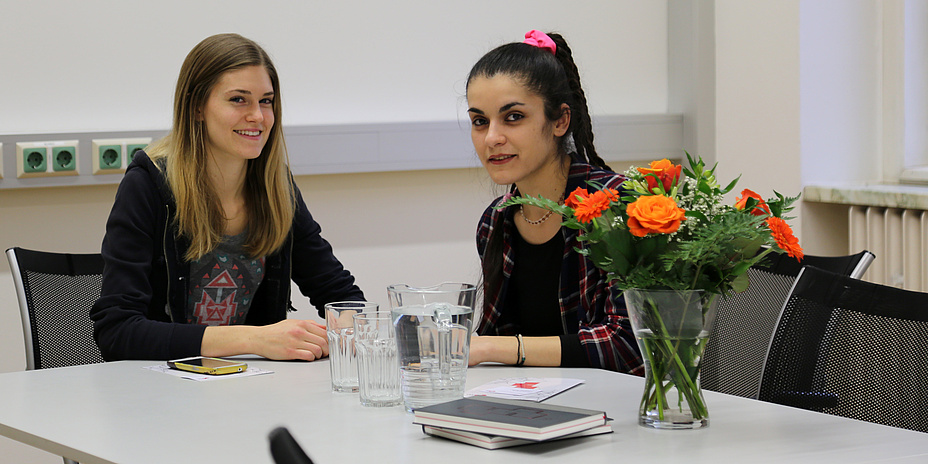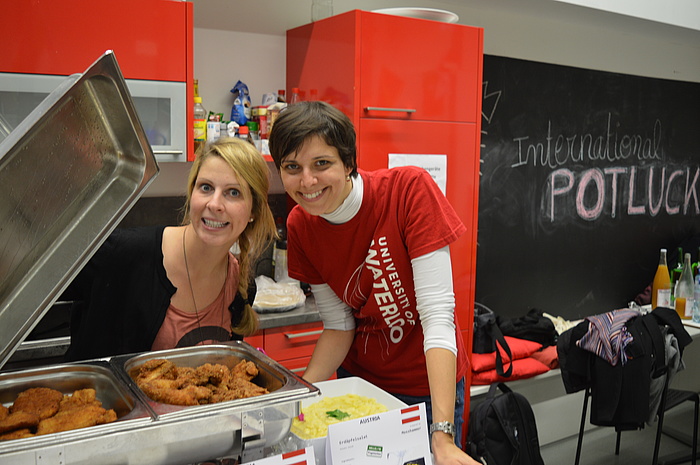“We’re buddies and friends”

News+Stories: You’re supervising Maria at TU Graz in the MORE initiative for refugees. What is the MORE initiative?
Nina: The MORE project was initiated all over Austria for refugees who want to start or continue a study programme in Austria. It assists them in their day-to-day student lives. It ranges from unbureaucratic registration as a non-degree seeking student, language courses, using libraries and attending specific courses. Mentors explain all the important things on the campus and give support in coping with day-to-day life.How did you come to be a mentor for refuge-seeking persons at TU Graz?
Nina: TU Graz sent out an email to all its students in the summer of 2015. It said in the email that this programme had been started and interested students should get in touch. In that summer many refugees arrived in Austria. I was working at Caritas at the time, so I had a connection. I absolutely wanted to do something, to help and give support, and I got in touch straight away. Unfortunately it took a year to make sure that the programme wasn’t somehow interfering in the asylum law. Finally I was assigned by the Students’ Union of TU Graz.What status must a refugee have to be able to register for the programme?
Nina: Maria was an asylum seeker and just got in touch with the TU Graz Welcome Center.What led you to TU Graz?
Maria: I came to Austria about one and a half years ago. In my homeland, Iran, I got my bachelor’s degree in tourism management. I registered for a German course at TU Graz and then got an email from Nina. So the steps I followed led me to the TU Graz Welcome Center, to a German course and then to an initial contact with Nina. Perhaps one day I’ll study electrical engineering or mechanical engineeringWhat is your field of study, Nina?
Nina: I’m studying chemistry – in the fifth semester.Don’t supervisor and supervised person have to study similar subjects?
Nina: Yes, that would have been an advantage, but many refugees only gave the information that they wanted to study – without saying exactly what. In principle we’re all assigned on the basis of shared fields, but sometimes they overlap.What was strange and unusual at the beginning at university in Austria or is it still unfamiliar?
Maria: There are many differences between my homeland and here. Here, people are more friendly, for example. I like that. We haven’t got any freedom in Iran. Men and women, for instance, can’t sit together. Some courses at Iranian universities are separated according to gender, and are either for men or women.Is the system of studying quite different in Austria compared to Iran?
Maria: Yes, quite different. You could say it’s more modern and better here. And study programmes are structured differently.What courses are you currently attending, Maria?
Maria: At the moment I’m attending a German course at “treffpunkt sprachen” at the University of Graz, and perhaps I can start studying next semester. But to do this I have to achieve a certain level of German.What experiences have you both had together – as supervisor and supervised person?
Nina: Well, for me it’s been very enriching. I’m very happy that meanwhile we’ve become good friends. We see each other nearly every week. It’s exciting and sometimes fun to exchange information about the different cultures – and yes, we learn a lot from each other.Does that mean you’ll stay in contact with each other after the programme comes to an end?
Nina: Oh yes, of course. We both went to the Red Cross at the end of November to ask about getting a job, but in the meantime without a decision on your asylum application you can only work a voluntary basis. As soon as she has a positive decision on her asylum application, she can do paid work. And I also want to help her get study assistance so she can finance her studies. When she really starts her studies, I’ll be here for her. Then I’ll show Maria the campus, the TUGRAZonline system and lots of other things.Does the MORE initiative actually give financial support?
Nina: Donations are collected and go to form a budget with which the German courses are paid. Apart from that, many of the supervised persons do not live in Graz, instead they live outside in refugee homes. Travel to Graz is also covered by donations.How long does the official supervision run for in the MORE programme?
Nina: The programme runs for one semester but the supervision time is longer if the two persons get on well.
Why would you recommend the programme?
Nina: As an Austrian student, I find it enriching to get an insight into other cultures and to see how well one can communicate – and that friendships really develop. I think that it’s really good for refugees because they’re offered a contact point where they can deal with daily issues and get support for day-to-day student life. And I found it really nice that we all baked biscuits together at Christmas in the Welcome Center.Do you have enough time left over for your studies?
Nina: Of course the supervision work takes up a lot of time but when you plan everything properly and set priorities, then you manage it.Will you register yourself for another supervision?
Nina: I think so.Links for persons with migration backgrounds
Asylum seekers studying as <link file:81299 _blank int-link-media merkblatt international students asylumseekers>regular students at TU Graz.Asylum seekers studying as <link file:81303 _blank int-link-media more programme>as non-degree seeking students (MORE Programm) at TU Graz.
<link http: www.more-uni.at _blank int-link-external external link in new>General information about the MORE initiative coordinated by Uniko Universities Austria.
Kontakt
Mag.iur.
International Relations and Mobility Programmes
Welcome Center
Mandellstraße 15/II, 8010 Graz, Austria
Tel.: +43 316 873 4920
<link int-link-mail window for sending>more@tugraz.at




